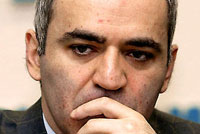Former world chess champion Kasparov will not run in Russian presidential elections
Kremlin critic and former world chess champion Garry Kasparov withdrew his candidacy from Russian presidential elections, accusing Russian authorities of repeatedly blocking supporters' efforts to hold a nominating conference.

Under election law, Thursday is the last day that potential candidates for the March 2 vote have to hold such conferences, the AP reports.
Marina Litvinovich, a spokeswoman for the broad-based opposition coalition Other Russia, which Kasparov heads, told The Associated Press that organizers have been unable to find an auditorium or hall in Moscow where activists could gather and vote to put forth Kasparov as a candidate.
She accused the government of pressuring landlords not to rent to Other Russia.
"Authorities put up as many obstacles as possible to stop us. That's it," she said.
Kasparov would have had little chance of winning the election. which is almost certain to be won by Dmitry Medvedev, the first deputy prime minister who got the powerful endorsement of President Vladimir Putin.
But the difficulty of obtaining a hall for a nominating meeting highlighted the array of impediments faced by opposition groups in Russia . Opposition forces frequently complain that they are denied venues for their meeting. Requests for permission to hold opposition marches are generally rejected or the marches are rerouted to areas where they will attract little attention.
Police violently dispersed a number of opposition rallies organized by Kasparov's group this year, and Kasparov was jailed for five days after a rally in Moscow last month.
Since leaving chess, Kasparov has become a vociferous critic of Putin's government, cobbling together a disparate coalition of nationalists, left-wing activists and liberals to try to generate broad opposition.
Also Thursday, riot police stopped two buses carrying dozens of Other Russia supporters who were traveling out of Moscow for the funeral of 22-year-old activist who died earlier month allegedly after being beaten by police during an Other Russia protest, Litvinovich said.
Kasparov and Eduard Limonov, leader of the radical National Bolshevik Party, had planned to attend the funeral.
On Monday, Putin announced he would support Medvedev as his successor - an announcement that, coupled with the Kremlin's domination of broadcast media, law enforcement agencies, and the nation's court system, virtually guarantees he will be elected president.
A day later, Medvedev called on Putin to become prime minister after the March 2 vote, a move that likely will allow Putin to keep control of the country's political scene even after he steps down as president.
Subscribe to Pravda.Ru Telegram channel, Facebook, RSS!




